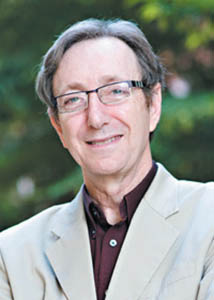


It isn’t the super-sized Jewish experience of New York City or some of its suburbs. But for an observant Jew living in New York State’s mid-Hudson Valley, the area still has plenty to offer. You could try out “chair yoga,” play more than your fill of Bingo, attend a weekly Torah class, immerse in a beautifully maintained mikvah or even attend a Jewish War Veterans meeting.
Yet in the rich, nearly 130-year history of the organized Jewish community in Poughkeepsie, New York, pushing a stroller or carrying any possession in public areas on Shabbat—without violating the laws of the day of rest—was out of the question.
After a six-year-effort by a dedicated force of nature named Harold Warren, that has changed. Warren, a retired court stenographer and the second vice president of Poughkeepsie’s historic Congregation Schomre Israel, saw many young couples leave the area for several reasons, including the lack of an eruv—a boundary allowing Jews to carry in public spaces on Shabbat.
In modern times, an eruv’s boundaries are typically marked by wires mounted on telephone poles. Warren dared to delve into the daunting tangle of red tape involved in eruv construction, such as unknowing utility companies and unfamiliar municipal officials. It’s difficult enough to put an eruv together in a larger city, but for non-Jewish residents of a smaller town like Poughkeepsie, the word “eruv” is absolutely foreign.
As Poughkeepsie’s younger Jews “became more educated than their grandparents,” they “expected more infrastructure” for the local Jewish community, Warren told The Jewish Link. The area once had a Solomon Schechter Day School (affiliated with Conservative Judaism), but it closed. With no kosher food sold in the immediate vicinity and no eruv, young Jews started leaving.
“It became more difficult to keep people here,” Warren said. “My wife and I became more observant, and we joined Schomre Israel 10 years ago. I said that we needed an eruv. We needed an eruv first, so we could start a day school.”
But the synagogue faced an uphill climb.
“We don’t have that many people to keep a community going,” said Warren, noting the community’s loss of Jewish young professionals who formerly worked for major companies in the area, such as IBM and Texaco.
After obtaining a foundation grant for the eruv, Warren started the process of explaining the Jewish legal concept to the region’s Central Hudson Gas & Electric Corp. as well as Verizon. Then came meetings with two different municipal government agencies—the City of Poughkeepsie and the Town of Poughkeepsie. The city consists of some 25,000 residents, while the town comprises unincorporated villages and is home to more than 140,000 people.
Warren worked closely with Rabbi Yosef Gavriel Bechhofer from Monsey, New York, an expert in eruv construction and planning. There was a great deal of “jumping through hoops,” Warren recalled. Over the course of six years, when elected offices changed hands, Warren would need to repeatedly explain the eruv to new officials who were unfamiliar with the concept.
Finally, earlier this month, with the utility companies on board and the municipal officials up to speed on their Jewish knowledge, the eruv received the proclamations and resolutions it needed. The new task, according to Warren, is “to get the word out” about Poughkeepsie Jewry’s crucial rite of passage.
“This is the beginning of reviving an old and friendly Orthodox community,” he said. The next step will be a Jewish day school, but “first we need children,” he added.
The synagogue vice president moved his family to Poughkeepsie because he always found New York City “too crowded and fast-paced,” and was offered a job in Poughkeepsie.
“It’s a nice small town with a couple of local theaters and golf courses. The Mowhawk Preserve is a lovely place for hikes,” said Warren, who expressed the desire to ensure Poughkeepsie is “on the Jewish map.”
“Once we’re known, we need to know what’s involved in running a day school,” he said. “We need to offer homesteading to people willing to move up and stay here. That will be a tough sell.”
“I felt I had to do something,” Warren added. “I have to succeed or fail when I’m still young enough to move. I’m doing something because it has to be done. I don’t want to move, I want to stay here. I would rather slug it out where I am.”
By Phil Jacobs









